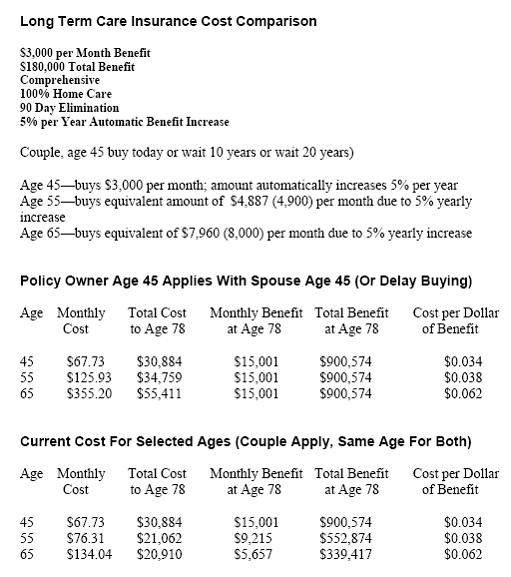About Long Term Care Insurance
 Long term Care Insurance -- Why Should You Buy It?
Long term Care Insurance -- Why Should You Buy It?
(1) It will help you keep your independence and dignity. Here's how. . . some of you will spend all your assets on care while others plan to give their money away or put it in trust. With no assets you will now qualify for a welfare program called Medicaid. Medicaid typically pays for a semiprivate room in a nursing home, and; not all nursing homes take Medicaid patients. In many states it's not easy to get Medicaid to cover home care or pay for assisted living. Many people want to stay at home, but with Medicaid may not be able to. And assisted living is rapidly becoming a preferred alternative to nursing home care for certain disabilities but Medicaid may insist on a nursing home instead.
(2) If you are married and you have a need for long term care, your spouse may be forced to pay for an outside caregiver. The cost is likely to come from your combined income and assets. If the need for paid care drags on too long, your spouse may be left with minimal cash assets for future needs. Insurance solves this problem and allows your spouse to keep the assets.
(3) Many healthy caregiving spouses won't spend their money and choose to "tough it out" on their own without help. If care of a disabled spouse drags on too long, this can have a devastating effect on the physical and emotion health of the caregiver.
(4) Surveys reveal that healthy caregivers often don't spend their money for help but they will use insurance if available. Insurance allows the healthy caregiver to buy much-needed respite from paid professionals, while at the same time, retaining the assets and possibly avoiding an early death from the mental and physical stress of care giving.
(5) If your children or extended family promise to take care of you if the time comes that you need care, insurance will help them do that. Probably neither you nor your children have thought of the prospects of moving you from place to place, changing your dirty diapers, cleaning up after "accidents" in the bathroom or helping you with bathing and dressing. Insurance will pay for aides to help with these tasks.
(6) If you are single and a need for long term care arises, insurance can pay for and coordinate that care. With insurance you won't have to feel you would be a burden for family or friends.
(7) If you have the desire to leave assets behind when you die, insurance will help preserve those assets from the cost of long term care.
How to Buy Long Term Care insurance
There are hundreds of long term care insurance companies selling hundreds of different types of policies. It can become very confusing. There are various conditions for home care and nursing home care, waiting periods, qualifying periods, inflation clauses and the list goes on. Here is a checklist of some of the things you need to know before you purchase a policy.
LONG TERM CARE INSURANCE BUYING CHECKLIST
the more "yes" answers you get the better off you are
- Is the insurance company rated at least A, A+ or A++ by A.M. Best?
- Is it a large diversified company selling more than just long-term care insurance?
- Is the insurance representative an expert in long-term care insurance? (Because of its complexity, almost all LTCi experts only sell LTCi; they seldom sell anything else.)
- Does the representative own a personal long-term care insurance policy?
- Is the policy you like tax qualified and if not, do you understand the ramifications?
- Are there at least 6 ADL's allowed for certification? • Does it allow "standby assistance"?
- Is it a "pool of money" as opposed to a "stated period"?
- Do you understand how the elimination period works? (This is extremely important.)
- Does it have an absence of prohibitive cost containment provisions?
- Is there an absence of "capping" of automatic benefit increase riders?
- Do you understand how the waiver of premium works?
- Does the assisted living facility benefit pay the same as for nursing home?
- Are you buying adequate home care coverage?
- Does the company lack a history of rate increases?
- Does the policy pay for homemaker services?
- Are the requirements for providers of home care reasonable and not excessively strict?
- Does the policy offer an alternative plan of care for coverage that doesn't exist today?
The chart below shows why it does not pay to wait. And this is based on current rates. These rates will not be in force 10 or 20 years from now. Estimates are that costs for new policies at the same buying age are going up about 12% a year. This means waiting to buy an older age plus this "rate creep" will make future costs prohibitive.

Find Eldercare Services in your area
We are dedicated to helping the American public with senior care and long term care planning. Use the menu below to locate eldercare services & help in your area.





